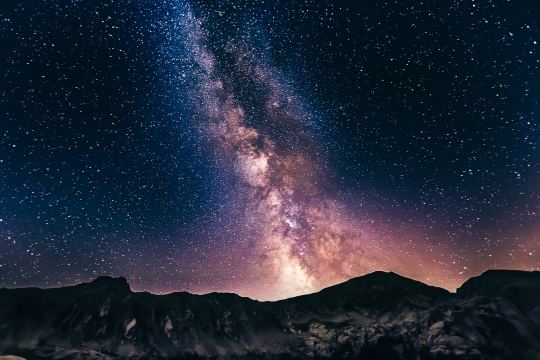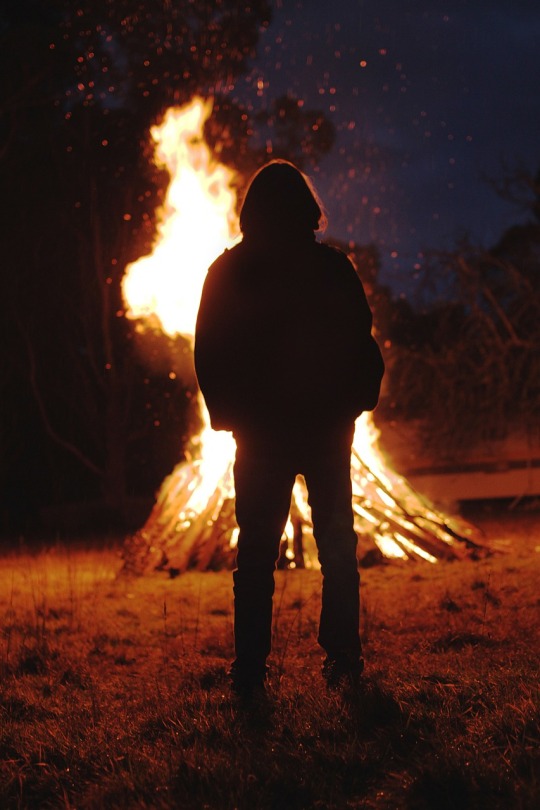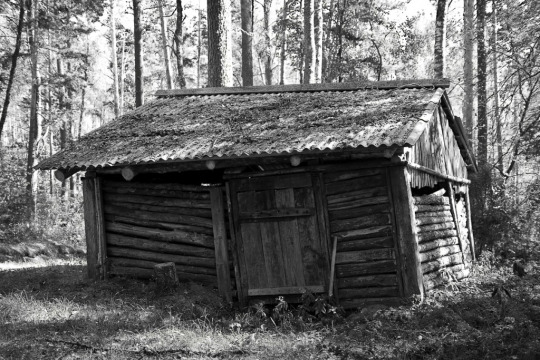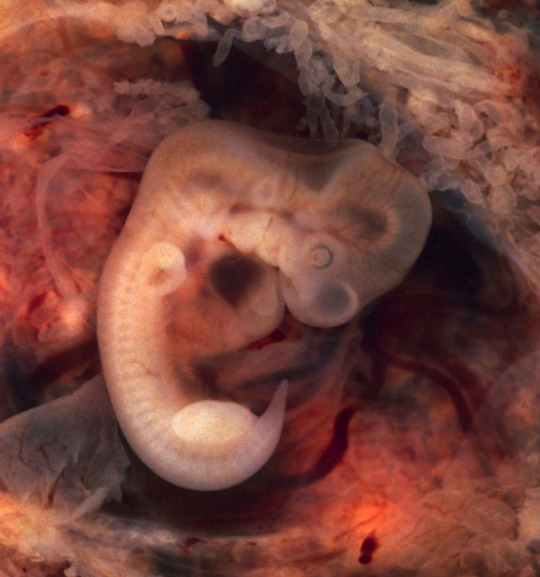Text
The World Is Vast

When you look up at the stars, they look like they are attached to a shell, not that far away. In reality, that is only a trick of your perception: the stars are not dozens but trillions of kilometers away, not a shell around us but an ocean we are lost in. Yet however much you try, you can't really see the distances as they really are, feel the mindnumbing size of the universe. You are a prisoner of the scale you evolved to understand.
We need not look up to the stars to find something incomprehensibly huge. We only need to look down. Seven thousand kilometers of rock beneath your feet, forty thousand to go around the Earth. Those numbers mean nothing to you. Translating them to time helps somewhat: thirty-four hours of falling at terminal velocity, and eleven months of brisk walking around the clock. Still, you are not seeing their true nature, but only a reflection of it, shadows on the wall. Giant, terrifying shadows.
Yet Earth itself, the place where every human being ever has lived and died, is unimpressive when compared to rest of the solar system: there is a storm on Jupiter that is by itself twice the size of Earth. But Jupiter too looks little compared to the Sun, which contains 99% of the mass of the whole solar system. Everything else is just the scraps left over.
And in space, distances easily trump sizes: between the Sun and the Earth one could fit a hundred Suns, between the Sun and Neptune, three thousand. And how much of the way to the closest star is that? One hundreth of one percent. Within rounding error.
And so it continues. Stars make up galaxies, between which the sky is simply dark. What for us is an edgeless ocean is just a puddle in the void. Galaxies form clusters, which form superclusters which form eldritch tendrils across the universe. And they are just silken threads when compared to the whole observable universe. Each level is incomprehensibly bigger than the last, and we are buried deep, deep down.
And the same applies to time. The universe is 13.7 billion years old, again an opaque number giving no sense of scale. When projected onto the calendar year, the history of the universe looks like this: At midnight New Year's Day, the universe is born. Fifteen minutes later, matter binds into atoms. Halfway through January the first stars light the universe. Earth forms as the summer ends.
Simple life comes into existence in the beginning of October, the Cambrian explosion has to wait until halfway through December. The age of the dinosaurs begins on Christmas Eve, and ends five days later. First humanlike creatures arrive for a late dinner the day before New Year's Eve; humans themselves only appear ten minutes before now. Agriculture is only twenty seconds old, written history half that. The last 2000 years amount to 4.6 seconds, each century a fifth of a second, too quick to count. A human life, bit less than that.
And where does all this vastness leave you, your on average less than two meters of height and eighty years of time? Like a single snowflake in a storm: unique, but inconsequential. And the storm too shall pass and the snow melt away, like it never fell in the first place. No matter how big something seems close up, it always looks tiny if you look from far enough.
When you look up at the stars, do you ever wonder what they would see if they looked back? The scorching Sun, just a point in the sky. The wide Earth, at most a faint shadow against it. Humans, perhaps guessed at from the composition of the atmosphere.
You, they couldn't see. And they wouldn't care to.
Photo by Denis Degioanni on Unsplash
0 notes
Text
The Edge Of Morality

We ascribe almost a cosmic significance to right and wrong. They divide people into good and bad, like morality is to humans what sharpness is to knives. We debate endlessly which actions belong where on the spectrum.
Yet morality is not that special: it is simply a set of instincts that promote cooperative behaviour, game theory as expressed by natural selection. We think not only about what is good for us, but also what is good for the tribe, because cooperation is ultimately advantageous for the genes that cause the behaviour.
That is the original domain of morality: the good of the tribe. You only needed to take account the relations of around thirty people, as larger societies have only been around for a tiny fraction of human evolutionary history. We haven't had time to adapt.
And thus, our instincts only get us so far. Beyond them, morality is simply undefined. Yet because we are so obsessed with it, for a good reason, we invent contradictory extensions, each focusing on different aspects of our instincts, each faulty in its own way.
Say a trolley was about to run over five people tied to the train tracks. Would you pull a lever and redirect the train, even if it would then hit one other person? Most people say yes. What if you had to push the innocent bystander onto the tracks yourself, sure that their mass would bring the trolley to a halt? Most people say no. While the situations share the same cost-benefit analysis, one makes you logical, while the other makes you psychotic.
Some philosophers think morality should be based on universal rules. Do not kill. Do not lie. Yet the elegant simplicity is instantly broken when somebody doesn't follow the rules. Violence is sometimes the best answer to violence. Few would object to shooting down a mass murderer.
On the other hand we have those for whom consequences are the most important. Yet under this system murdering someone innocent to save a hundred people could be mathematically correct. Or even torturing one person relentlessly for decades, if as a result people would never get eyelashes in their eyes again. Well, at least if the math works out.
And that is ignoring the edge cases. How many coma patients can be sacrificed to save one conscious person? How many people with cancer for one healthy person? Are young people more valuable than older ones, or more accomplished people than those who are wasting their life? When do people start to be valuable, and when do they stop?
Things also get complicated when expanding the concept beyond humans: How many dogs for one human? How many trees? Should you drive a whole species of mosquitoes extinct to end malaria once and for all? Which endangered species are the most important to save?
We evolved for a life where we relied on our tribe for survival. Immoral, uncooperative behavior was a quick path to exile, essentially a death sentence. And so, we evolved to obsess over morality, to involve it in every decision. And when the world gives us something where our instincts give no clear answer, we demand that there must be one.
But sometimes, there just isn't. You try to approximate using analogies, bring the question into a domain you are comfortable with. Yet often those analogies conflict, and you flash from one contradictory viewpoint to another, like an image flickering from a vase to two faces and back again.
And no matter what you choose, it will always feel wrong.
Photo by Benjamin Nelan
0 notes
Text
You Might Be Wrong About Everything

We are born empty, knowing only to cry at the first sign of discomfort. We watch the world flashing by, and piece by piece we construct a replica inside our minds, one made of concepts, rules and patterns. We gaze out into the chaos, and see the order lying underneath. Or perhaps we impose it.
We spend most of our lives there, in the replica, where things make sense and the terrifying freedom of reality is pruned into the much simpler game of everyday life. You know your replica like the back of your hand. It's a cozy place.
Throughout our lives, we fit more and more of reality into our replicas, be it what we see for ourselves or what we hear from others. But sometimes, we are handed something that just doesn't fit. Something exposes a crack between your beliefs and reality, a flaw in the replica we hadn't noticed before. Maybe we were mistaken, maybe we were misled. Maybe the information is just out of date.
We sigh, get to work, and start taking the belief apart to see if it still could be salvaged. If no amount of caveats or reformulations help, we throw it out to the landfill. Maybe we have something better to replace it with, or maybe it leaves an uncomfortable void in its place. Still, we deal with it.
But sometimes, the challenged belief is like an outer wall, unable to be removed without forming gaping hole. We crave for our replica to fit together, to form a complete picture, and that craving can turn against reality threatening to tear it apart. We warp reality or explain it away. We sweep the dust under the rug, hang a painting to hide the crack in the wall.
These excuses and explanations accrete, networks of beliefs forming a cocoon around the belief they have been put up to protect. Eventually it becomes almost impermeable, every potential criticism accounted for. The process brings in other beliefs that once would have been rejected outright, but now seem utterly reasonable. A wide swath of the replica is slowly remade, with the one comfortable falsehood at its center, a scraggly, unstable construction holding together mostly by its sheer mass. A whole worldview, only matching reality in the most superficial ways.
This extreme defence mechanism isn't fundamentally about protecting the belief. It is about protecting ourselves. If our belief isn't true, maybe our senses and our intuition can't be relied upon. Maybe there is no grand plan for the world, but only uncaring chaos. Maybe we aren't special and important. Maybe we, the people closest to us, and those who we trust the most, are all just wrong. Our minds need shelter just as our bodies do.
The scary part is this: how do you know that you don't harbor a cocoon of your own? It would just feel like a natural part of your worldview. An obvious truth. A religion, a political stance, a conspiracy theory, an ideology. A lack of them. Even rigorous skepticism can only reduce the likelihood of delusion, not eliminate it completely.
But obviously none of this applies to you. You know what is really true. The people who think differently are the deluded ones.
You are absolutely sure of it.
Photo by Atis Gailis
0 notes
Text
Free Will Is Meaningless

Ancient philosophers already imagined that all things were made from the same underlying substances, following the same rules. Modern scientists found those substances, elementary particles, and puzzled out the rules they follow.
While much remains to be understood, what we know already explains almost everything in the physical world, from why the sun shines to how grass grows. And, by extension, how the fundamental units of the human brain operate.
What we discovered is that all things in the world are predictable. Drop a ball a thousand times under the same circumstances, and it will fall the same way a thousand times. We live in a clockwork world, where the future is only determined by the past. Even more, we are a part of that clockwork, subject to the same laws, no more free than water is to flow uphill.
Factoring the inherent randomness of quantum mechanics back in doesn't save you either. If your decisions are random, you have exactly as much freedom as a die has to land which way it pleases. Every game of dice is equivalent to one where all of the rolls were written down in advance, their outcome already decided.
In fact, what would a free choice, free will, even mean? Something that is neither predictable nor random? Something neither decided by the past nor unrelated to it? Any combination of the two wouldn't work either: a weighted die has no more freedom. The only conclusion is that the words never really referred to anything, the concept belonging in the realm of the absurd, where married bachelors tell truthful lies.
Still, our society is built on the idea that there are no further causes to our decisions than our "will"; that at any moment we could have acted in any way. Criminals get punished, successful people rewarded. Justice, we call it.
But really we have no say in what we become. Our genetics, our background, our experiences, everything that makes us who we are, is determined by things outside our control. Criminality is correlated with poverty, success is correlated with privilege. One person ends up in a mansion, another in a prison, but neither could draw their own path, no more than a snake can swallow its own tail.
Your greatest acts of courage and your worst missed opportunities were already determined by your past. Rewind your life and run it again a thousand times, and every time it would lead right here. You always did what you felt, or thought, was for the best. How could you have chosen otherwise? Why would you have?
These words too will slightly alter your course, like a gust of wind pushing a derelict ship onto a different current. And you, its captain, keep turning the wheel, which never was connected to the rudder, always claiming you meant to go that way.
You might ignore it, retreat behind obscure redefinitions or even deny it outright. I won't fault you for it. You will believe what you want.
You have no choice in the matter.
Photo by Andrew Gustar
0 notes
Text
Everything You Want Is Arbitrary

It took us millennia to understand natural selection, but when laid out in the simplest terms it is little more than a tautology: those systems that produce the most copies of themselves, produce the most copies of themselves, of which the most efficient ones produce the most copies of themselves, recursively.
The method of selection and the criterion of selection are one and the same: the ability to produce more offspring. There is no intent behind it, no purpose. Genes might called selfish, but they're as much just on for the ride as we are, no "better" than their inert counterparts that rotted away billions of years ago. There is nothing to measure by.
And from this process, emerges the mind. Simple at first, a layer of if-then logic between stimulus an reaction, but eventually an intricate, adaptable system of information processing. Something with desires.
And it's those desires that underlie everything that you, as much an evolved being as a bacterium, ever do. But those desires are all selected for a single underlying goal: produce more offspring. Hunger and thirst, desire for friendship and for love, morality and curiosity,. All that you value is somehow based on evolution, or side effect of something that is.
And here lies the problem. It is known as Hume's Guillotine: you can't derive what ought to be the case, your values, from only what is the case. Without already having values, one can't produce any. Yet that is exactly what evolution did. Somewhere in the endless generations is buried a logical fallacy of turning what is to what should be. The foundation of all human values.
All your preferences, your dreams, your hobbies, all based on mental patterns that helped your ancestors to survive, to make friends, to find a mate or care for their children. In short, to produce offspring. That is the ultimate design parameter of your desires. The first cause of all you do.
You are a machine programmed by the eldritch god that is Natural Selection. You had no say in what you are, what you would want to do. Should the god, the process, have been something else you would have been something else too. What you became was, in a sense, arbitrary.
If you feel disillusioned with your desires, you should just try to ignore it.
It's not like you have anything better.
0 notes
Text
Introduction

Life is simple.
Sure, the intricacies are endless, but the paths are already drawn for you, the basic rules easily understood. Pick a direction, go as far as you can, and have fun.
And never look down.
For we live our lives in cloud castles, and under our feet is just vapor, incapable of supporting our weight. Undoubtable facts, that when doubted were clearly just necessary lies all along.
And when you've glimpsed the abyss, you are pulled out of the magic circle of the game of life, not quite sure why you were ever so fixated on your strategy, on trying to maximize your score. Yet, without life there is nothing. And so you keep playing, keep walking, trying your best to ignore the fact that there is nothing under your feet.
It is a curse, but also a blessing. For those who know life is just a game, yet play it of their own volition, have the most fun.
Photo by Johannes Plenio on Unsplash
0 notes